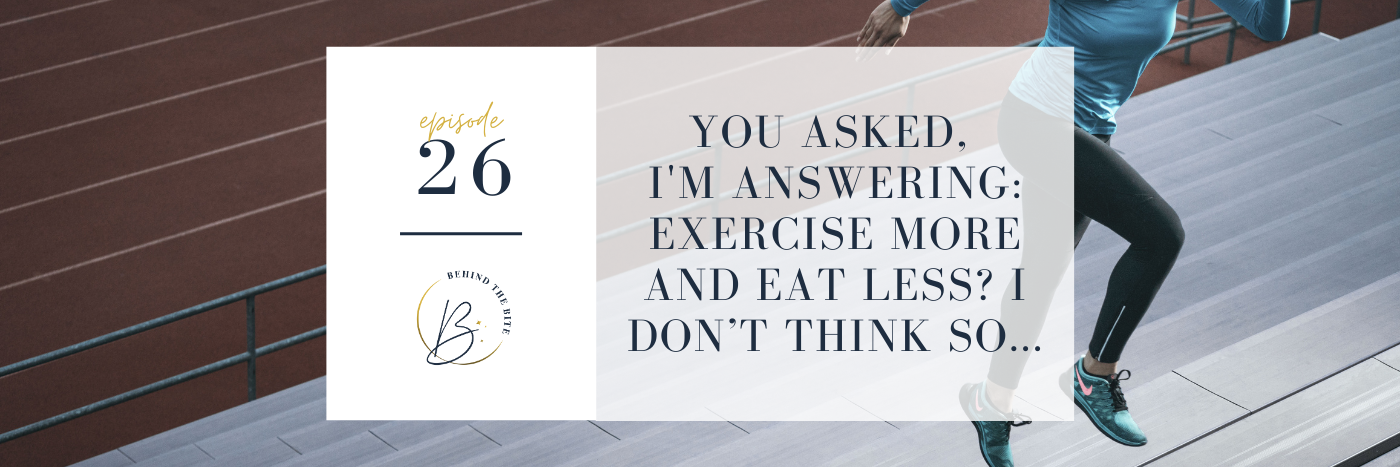What is your relationship to exercise and eating? Do you do them in conjunction with one another for good, or for bad? Why can it be dangerous to have a black-and-white mindset about exercise and eating?
In this podcast episode, I answer your questions about the relationship between exercise and food and why you should view exercise through the lens of it being something to benefit your physical and emotional wellbeing.
IN THIS PODCAST
- It’s a slippery slope
- Exercise and food do have other purposes
- Exercise-statements to ask yourself
It’s a slippery slope
In those horrible times of my eating disorder, everything thought and feeling [I had] about my appearance, my weight, and my clothes hinged on my exercise for the day. (Dr. Cristina Castagnini)
If you get stuck in this mindset it can lead to serious self-damage, where you restrict yourself one day for not exercising enough, or you do an overly-intense exercise the next day because you did not have enough time for an exercise today.
These two things, eating, and exercise, can be weaponized against yourself. It is important to treat them as separate entities because together, in a mind that is already under strain with an eating disorder, you can cause yourself serious damage.
Exercise and food do have other purposes
Exercise is good for you for stress release, moving tension out of your body, uplifting your mood, keeping your heart strong, and increasing blood circulation, among thousands of other benefits. Exercise is not, and should not, be a punishment to yourself for what you did or did not eat in a day.
I know some people use exercise for different goals. If you’re somebody listening to this and you have cardiovascular fitness goals, maybe you’re training specifically for a 10k race or you want to complete a marathon then that takes a certain amount of training for sure, but that’s an entirely different goal for exercise. (Dr. Cristina Castagnini)
Food, similarly, is about nutrition, community, culture, family events, exploration, curiosity. You can eat for the sake of the health of your body if you have any underly health issues, partake in cultural celebrations, enjoy a birthday, and to try new recipes.
Using black and white thinking around exercise and food is what can lead to it being one-dimensional in your mind and what allows you to punish yourself for having “used” them in the ways in which you think you “cannot” use them.
Exercise-statements to ask yourself
- My exercise interferes with important activities such as work or socializing.
- I exceed three hours of exercise per day.
- I experience stress or guilt when I am unable to exercise.
- I exercise at inappropriate times and places and cannot stop the behavior.
- I continue to exercise despite injury, illness, or medical complications.
If you answer yes to any of these questions, it is highly recommended that you examine your relationship to exercise and consider seeking the help that can assist you.
Exercise in moderation and at different times can be incredibly beneficial to you. It can help you:
- Feel less anxious and stressed after a long day at work by taking a brisk walk or doing a routine at the gym.
- Feel better about your physical abilities which will help boost your confidence and self-esteem.
- Boost your energy. Regular physical activity builds muscle strength and endurance and increases your energy levels.
- Get better and deeper sleep, although try not to exercise three hours before bedtime.
- Improve your sex life. It maintains and enhances arousal for women and helps men prevent erectile dysfunction.
- Improve your social life because exercise can take multiple forms: skating, biking, hiking, climbing, and dancing.
USEFUL LINKS
MEET DR. CRISTINA CASTAGNINI

I am a licensed Psychologist and Certified Eating Disorder Specialist.
While I may have over 20 years of clinical experience, what I also have is the experience of having been a patient who had an eating disorder as well.
One thing that I never had during all of my treatment was someone who could look me in the eye and honestly say to me "hey, I've been there. I understand".
Going through treatment for an eating disorder is one of the hardest and scariest things to do. I remember being asked to do things that scared me. Things I now know ultimately helped me to get better. But, at the time, I had serious doubts and fears about it.
If even one of my providers had been able to tell me "I know it's scary, but I had to go through that part too. Here's what will probably happen...." then perhaps I would not have gone in and out of treatment so many times.
My own experience ultimately led me to specialize in treating eating disorders. I wanted to be the therapist I never had; the one who "got it".
I will be giving you my perspective and information as an expert and clinician who has been treating patients for over 2 decades.
But don't just take my word for it...keep listening to hear the truly informative insights and knowledge guest experts have to share.
I am so happy you are here!
THANKS FOR LISTENING
Did you enjoy this podcast? Feel free to comment below and share this podcast on social media! You can also leave a review of
Behind The Bite on Apple Podcasts (previously) iTunes and subscribe!
 I am a licensed Psychologist and Certified Eating Disorder Specialist.
While I may have over 20 years of clinical experience, what I also have is the experience of having been a patient who had an eating disorder as well.
One thing that I never had during all of my treatment was someone who could look me in the eye and honestly say to me "hey, I've been there. I understand".
Going through treatment for an eating disorder is one of the hardest and scariest things to do. I remember being asked to do things that scared me. Things I now know ultimately helped me to get better. But, at the time, I had serious doubts and fears about it.
If even one of my providers had been able to tell me "I know it's scary, but I had to go through that part too. Here's what will probably happen...." then perhaps I would not have gone in and out of treatment so many times.
My own experience ultimately led me to specialize in treating eating disorders. I wanted to be the therapist I never had; the one who "got it".
I will be giving you my perspective and information as an expert and clinician who has been treating patients for over 2 decades.
But don't just take my word for it...keep listening to hear the truly informative insights and knowledge guest experts have to share.
I am so happy you are here!
I am a licensed Psychologist and Certified Eating Disorder Specialist.
While I may have over 20 years of clinical experience, what I also have is the experience of having been a patient who had an eating disorder as well.
One thing that I never had during all of my treatment was someone who could look me in the eye and honestly say to me "hey, I've been there. I understand".
Going through treatment for an eating disorder is one of the hardest and scariest things to do. I remember being asked to do things that scared me. Things I now know ultimately helped me to get better. But, at the time, I had serious doubts and fears about it.
If even one of my providers had been able to tell me "I know it's scary, but I had to go through that part too. Here's what will probably happen...." then perhaps I would not have gone in and out of treatment so many times.
My own experience ultimately led me to specialize in treating eating disorders. I wanted to be the therapist I never had; the one who "got it".
I will be giving you my perspective and information as an expert and clinician who has been treating patients for over 2 decades.
But don't just take my word for it...keep listening to hear the truly informative insights and knowledge guest experts have to share.
I am so happy you are here!


Comments